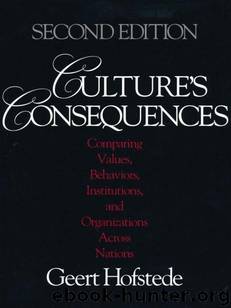Culture's Consequences: Comparing Values, Behaviors, Institutions and Organizations Across Nations by Hofstede Geert

Author:Hofstede, Geert [Hofstede, Geert]
Language: eng
Format: epub
Publisher: Sage Publications, Inc
Published: 2001-04-19T17:00:00+00:00
Avoiding Ethnocentrism
Ethnocentrism has been defined as an “exaggerated tendency to think the characteristics of one’s own group or race superior to those of other groups or races” (Drever, 1952, p. 86). Faucheux (1976, p. 309) has compared ethnocentrism with egocentrism. Egocentrism is a phase in the development of a child before it can take the viewpoint of an Other; so Faucheux sees ethnocentrism as a phase in the development of a social science—in the case he refers to, of social psychology. In the history of anthropology there was an ethnocentric phase that was subsequently overcome. Other social science disciplines in which cross-cultural contacts play a less central role than in anthropology are less conscious of their ethnocentrism.
The cultural component in all kinds of behavior is difficult to grasp for people who have always remained embedded in the same cultural environment; it takes a prolonged stay abroad and mixing with other nationals there for us to recognize the numerous and often subtle differences in the ways they and we behave, because that is how our society has programmed us. If I take the train from Rotterdam, Holland, to Brussels, Belgium, I can usually tell the Belgian passengers from the Dutch; most Dutch people greet strangers when entering a small, enclosed space like a train compartment, elevator, or doctor’s waiting room, but most Belgians do not.
Ethnocentrism can be very subtle, and it is certainly easier to recognize it in contributions from other cultures than in those from one’s own. Let us take an example. In the preceding subsection of this chapter, I referred to Haire et al.’s (1966) study of managers’ values in 14 countries, deploring that the authors forced their data into a classification according to Maslow’s hierarchy of human needs. Maslow’s hierarchy implies that needs appear in an order. Some, like “security,” are lower, more basic; when a lower-level need is satisfied, the next higher need takes its place, and so on. Haire et al. ordered their five need categories as follows: security, social, esteem, autonomy, self-actualization. The last of these is Maslow’s supreme category, and in Haire et al.’s order it includes three items: personal growth, self-fulfillment, and accomplishment.
Haire et al. (1966) showed the mean scores for 14 countries on the five need categories for need satisfaction (p. 89) and need importance (p. 100). The rank orders of these mean scores are extremely interesting. For three countries (Italy, England, and the United States) the satisfaction mean scores appeared exactly in the Maslow order: security most satisfied, self-actualization least. From these, the United States was the one for which the spread between the need category scores was widest. For need importance no country followed exactly the Maslow order, but the United States came closest: The rated importance of the five need categories rank correlated with Maslow with rho = .90*.55 The next highest rank correlations were rho = .80 for Italy and rho = .70 for England and Norway. The direction of the correlation in these countries shows that self-actualization was most important, security least.
Download
This site does not store any files on its server. We only index and link to content provided by other sites. Please contact the content providers to delete copyright contents if any and email us, we'll remove relevant links or contents immediately.
| African-American Studies | Asian American Studies |
| Disabled | Ethnic Studies |
| Hispanic American Studies | LGBT |
| Minority Studies | Native American Studies |
Cecilia; Or, Memoirs of an Heiress — Volume 1 by Fanny Burney(31351)
Cecilia; Or, Memoirs of an Heiress — Volume 3 by Fanny Burney(30949)
Cecilia; Or, Memoirs of an Heiress — Volume 2 by Fanny Burney(30907)
The Great Music City by Andrea Baker(21572)
We're Going to Need More Wine by Gabrielle Union(18086)
Bombshells: Glamour Girls of a Lifetime by Sullivan Steve(13119)
Pimp by Iceberg Slim(12947)
All the Missing Girls by Megan Miranda(12775)
Fifty Shades Freed by E L James(12463)
Talking to Strangers by Malcolm Gladwell(11908)
Norse Mythology by Gaiman Neil(11901)
Crazy Rich Asians by Kevin Kwan(8372)
Mindhunter: Inside the FBI's Elite Serial Crime Unit by John E. Douglas & Mark Olshaker(7850)
The Lost Art of Listening by Michael P. Nichols(6484)
Enlightenment Now: The Case for Reason, Science, Humanism, and Progress by Steven Pinker(6414)
Bad Blood by John Carreyrou(5782)
The Four Agreements by Don Miguel Ruiz(5532)
Weapons of Math Destruction by Cathy O'Neil(5046)
We Need to Talk by Celeste Headlee(4881)
